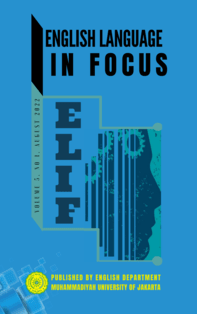Teacher's Perception on The English We Speak Podcast as Learning Media
DOI:
https://doi.org/10.24853/elif.5.1.27-38Abstract
AbstractTechnology is an asset for mankind, a great invention that drives a civilization to be more advanced. Its use is very useful to support human desires and achievements in all aspects. Technology has played an important role without exception, of course we can have a good or bad impact depending on the use of this technology in our lives. In the field of education, the use of technology is an opportunity to advance and rejuvenate children in learning. This study aims to enable teachers or teaching staff out there to consider podcasts as an introductory medium for listening material in English. In this study using descriptive qualitative methods to find the data needed also to find out whether this media has a positive or negative impact on its implementation. This study uses the perceptions of teachers or teaching staff. The teacher is one of the agents of the learning material, of course the teacher will understand better whether a media has a good impact or not in the learning development of their students.Keywords: podcast, audio digital, learning media.References
REFERENCES
Cahyati, S. S., Parmawati, A. and Atmawidjaja, N. S. 2019. Optimixing English Teaching AndLearning Process to Young Learners ( A Case Study in Cimahi). Journal of Education Expert (JEE), 2(2), 107-114.
Cester, A., Buntine, A., Hammond, K., and Atkinson, L. 2011. Podcasting in education: students attitudes, Behavior and self-efficacy. Educational Technology & Society, 14(2), 236-247
Criollo-C, Santiago, et al. 2021. “Mobile Learning Technology for education: Benefits and pending issues.”
Creswell, J.W. 2014. Research Design: Qualitative, Quantitative, and Mixed Methods Approaches (4th ed.) Thousand Oaks, CA: Sage.
Drew, C. 2017. Edutaining audio: an exploration of education podcast design possibilities. Educational Media International, 51(1), pp. 48-62.
Gaden, G. 2010. Podcasting: thinking about new opportunities for pedagogy and activism. thirdspace.
Gardiner, P. 2017. Playwriting and Flow: The Interconnection Between Creatifity Engagegement and Skill Development. International Journal of Education and the Arts.
Hutabarat, P. M. 2020. Pengembangan Podcast Sebagai Media Suplemen Pembelajaran Berbasis Digital pada Perguruan Tinggi. Jurnal Sosial Humaniora Terapan, 2(2), pp. 107-116.
Jones, L. A. 2010. Podcasting and performativity: multimodal invention in an advanced writing class. Composition Studies, 38(2), 75-91.
Tarmawan, I. et al. (2021). The Role of Podcast as an Alternative Media for Learning and Distribution of Audio Based Content. UNIKOM.
Moleong, Lexy J. 2009. Metode Penelitian Deskriptif Kualitatif. Bandung Resmaja Rosdakarya.
Neegaard, M., et al. 2009. Qualitative description – The poor cousin of health research. BMC Medical Research Methodology, 9 (52).
Palenque, Stephanie Maher. 2016. The Power of Podcasting: Perspectives on Pedagogy. Grand Canyon University.
Ramdhani, Muhammad Ali and M. Hilmi. 2015. The Criteria of Learning Media Selection for Character Education in Higher Education. In: International Conference of Islamic Education in Southeast Asia, Malang, Indonesia.
Richard, Jack C. (2008). Teaching Listening and Speaking from Theory to Practice. New York: Cambridge University Press.
Published
Issue
Section
License
Authors who publish with this journal agree to the following terms:
- Authors retain copyright and grant the journal right of first publication with the work simultaneously licensed under a Creative Commons Attribution License that allows others to share the work with an acknowledgment of the work's authorship and initial publication in this journal.
- Authors can enter into separate, additional contractual arrangements for the non-exclusive distribution of the journal's published version of the work (e.g., post it to an institutional repository or publish it in a book), with an acknowledgment of its initial publication in this journal.
- Authors are permitted and encouraged to post their work online (e.g., in institutional repositories or on their website) before and during the submission process, as it can lead to productive exchanges, as well as earlier and greater citation of published work (See The Effect of Open Access).


